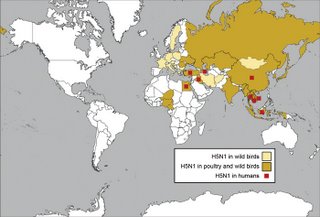Are you ready for the Bird Flu?
 At Jefferson County Health & Environment, where I work, we are spending a lot of time and resources preparing for the inevitable Avian Flu Pandemic. Folks... this is real. You should start preparing now.
At Jefferson County Health & Environment, where I work, we are spending a lot of time and resources preparing for the inevitable Avian Flu Pandemic. Folks... this is real. You should start preparing now.What is the Avian Flu?
Bird flu, or avian influenza, is a Type A influenza virus that affects mostly birds and occasionally pigs. The virus can pass from bird to bird when it is inhaled and from contact with infected droppings. Contaminated equipment, infectious particles carried on the feet and bodies of animals, and migratory waterfowl can spread the disease. Since December 2003, a highly pathogenic strain has devastated dozens of Asian domestic poultry stocks, and several human infections have been reported.
What can be done to prepare and prevent Avian Flu? The best thing you can do is to wash your hands often. Another thing you can do to prepare is to start stocking food and water supplies now, just a little extra here and there when you go to the store. Start buying extra canned goods for storage. Make sure everyone in your family has a 72 hour kit which will prepare you for possible quarantines.
In March 24 Colorado held a pandemic flu conference hosted by Gov. Bill Owens and Mike Leavitt, secretary of the U.S. Department of Health and Human Services (HHS). About 1,000 people attended the event at the Colorado Convention Center in Denver. Public health officials fear if the avian flu virus mutates, it could more easily spread to humans. Since it would be a new virus, people's immune systems wouldn't recognize it, allowing the virus to spread quickly, potentially affecting 25 percent to 40 percent of the work force. Read more about this.
Ask your employer to start preparing now by preparing scenarios for possibly working at home with telecommuting technologies and strategies.
Here are some excellent resources:
- Dept of Health and Human Services http://pandemicflu.gov/
- CDC - Center of Disease Control
- Yahoo Full Coverage - Avian Flu
- Article: Colorado Springs Gazette
- Denver Post Editorial - State must plan for Bird Flu


0 Comments:
Post a Comment
<< Home